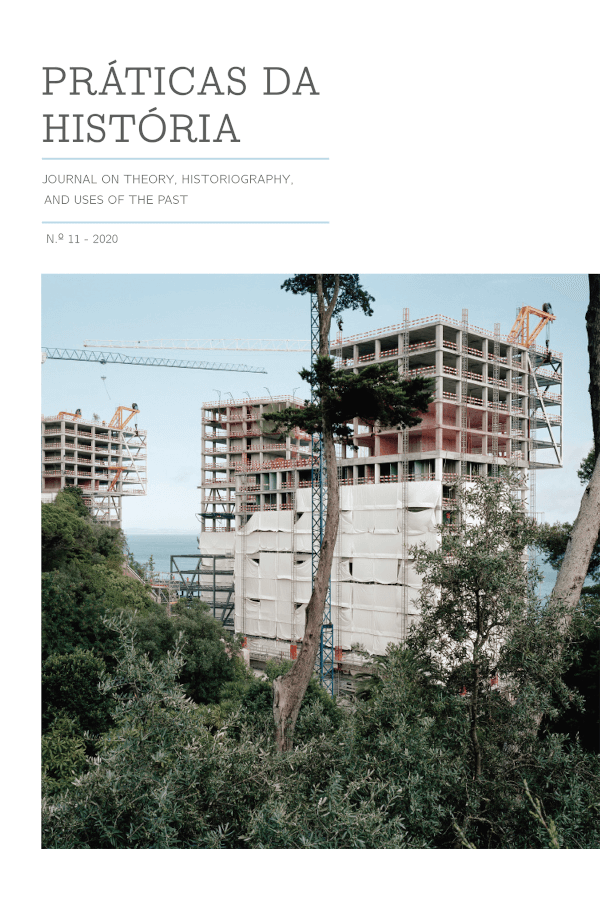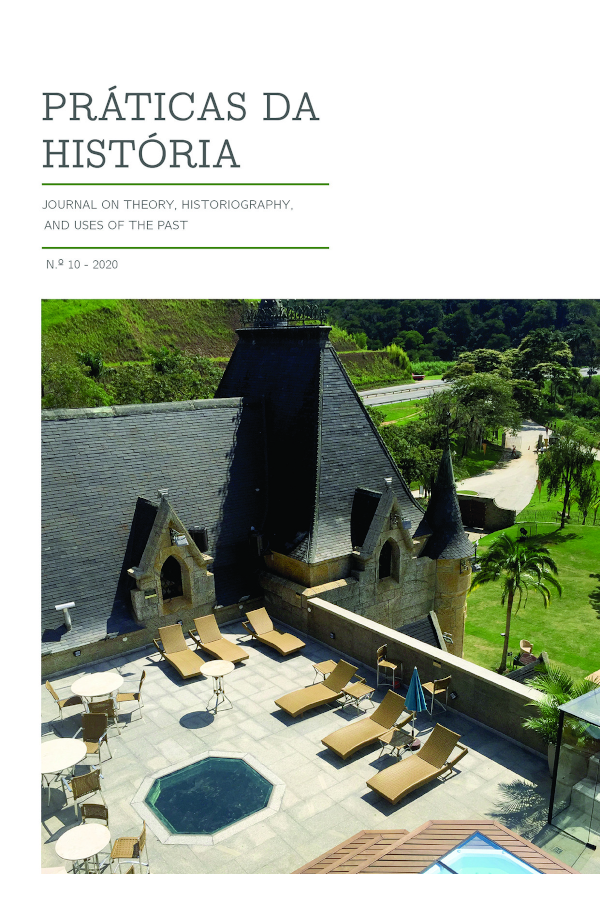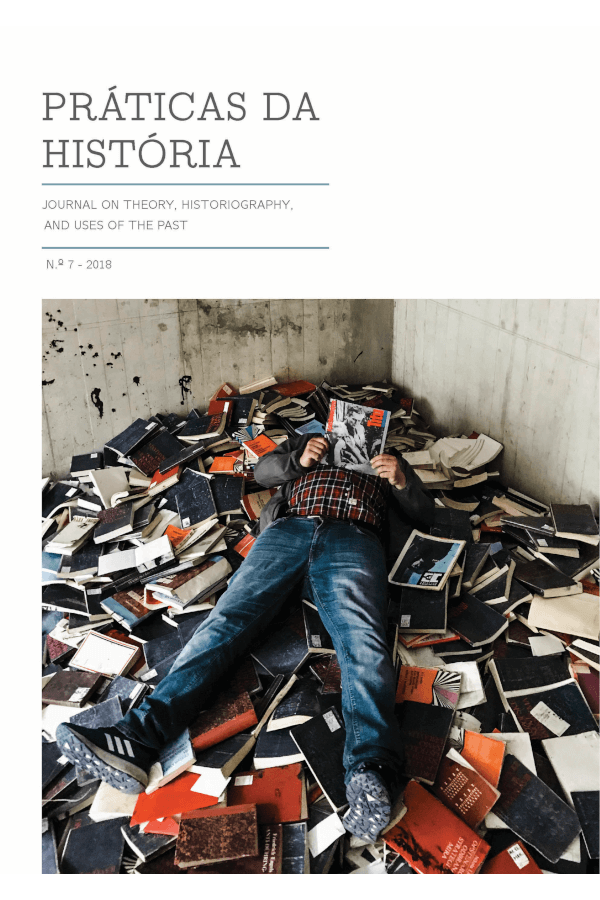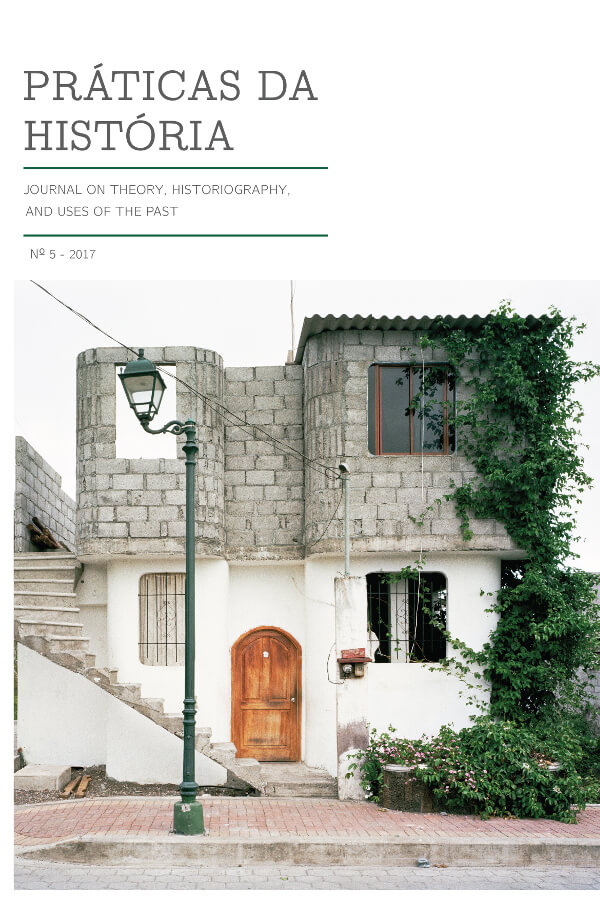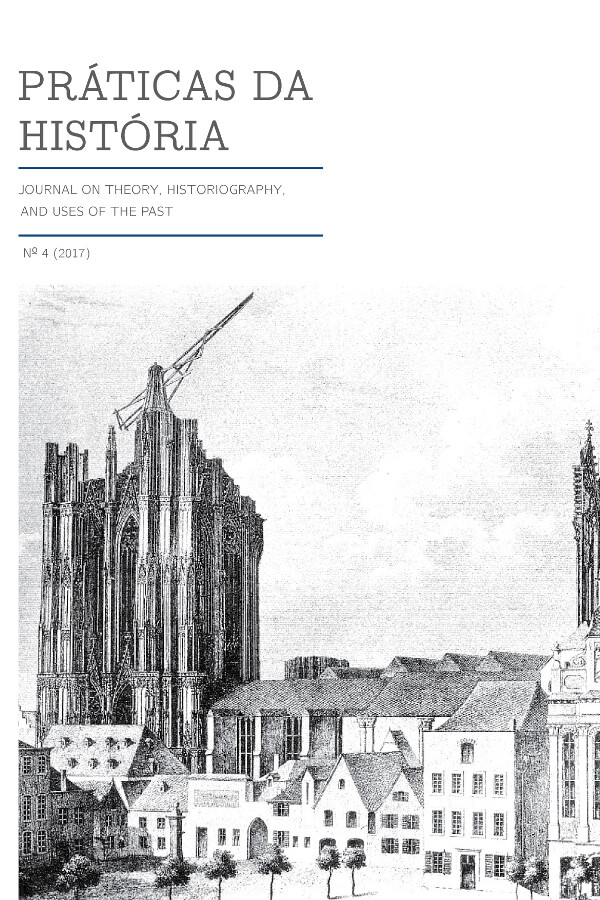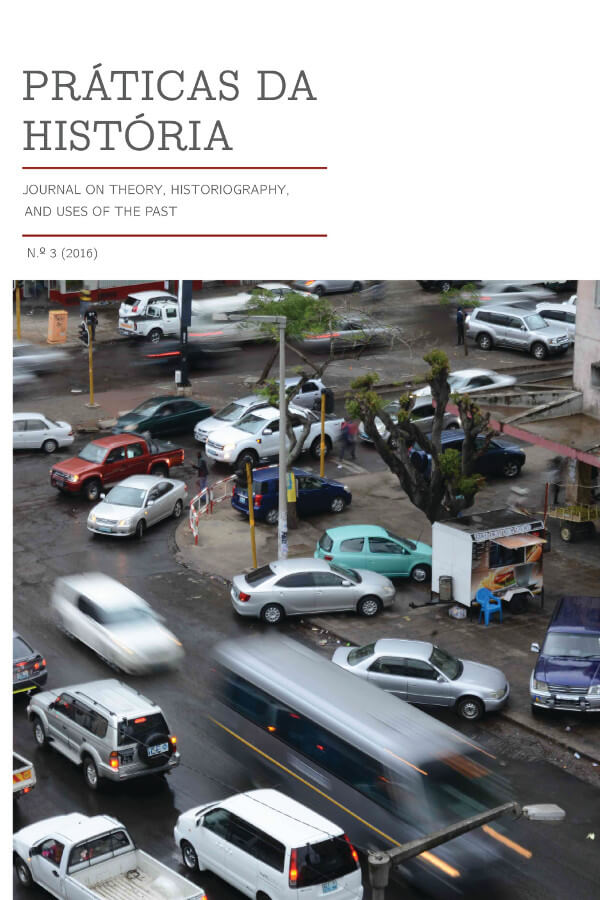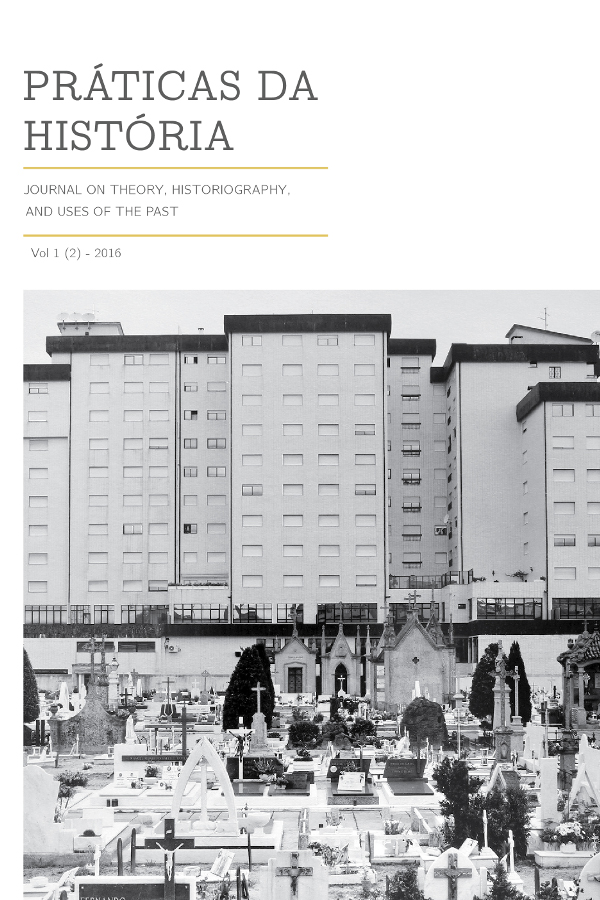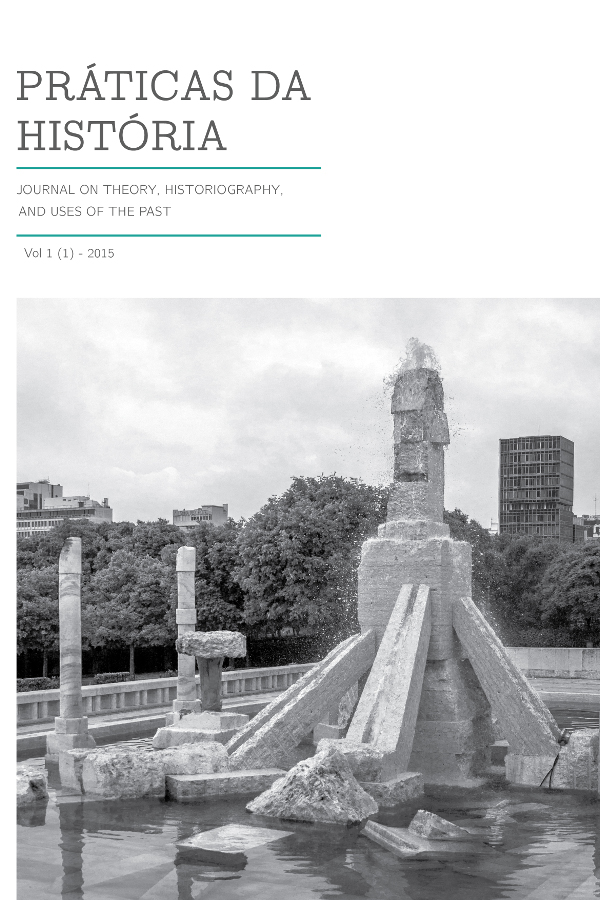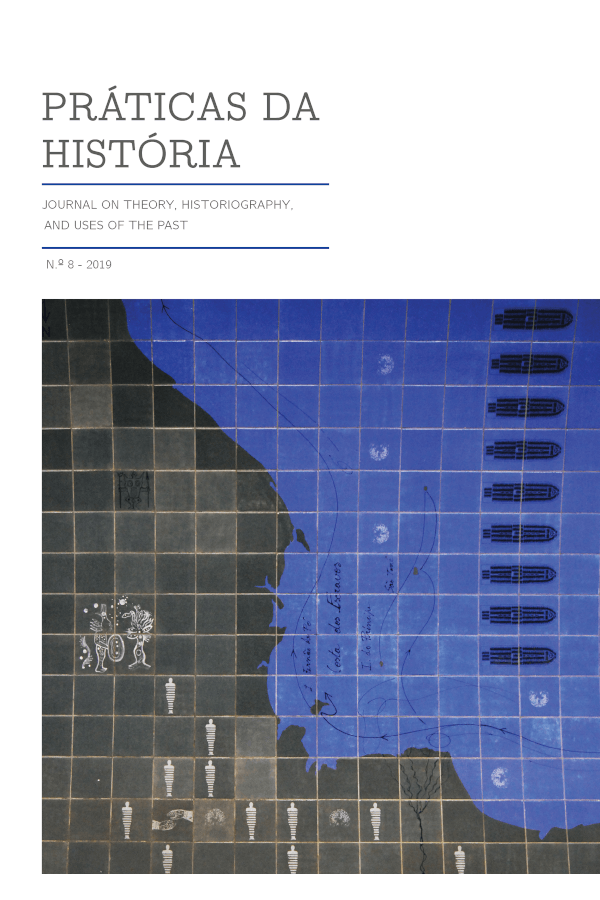
Práticas da História No. 8
Sep 23, 2019 | 2019, Editions, Práticas da História

Práticas da História – Journal on Theory, Historiography and Uses of the Past
- 2019
- Issue 8
- ISSN: 2183-590X
- Thematic dossier: Celebrations of the “Portuguese Discoveries” — Edited by Elisa Lopes da Silva and José Miguel Ferreira
Editorial note:
As early as 2016, shortly after publishing the first issue of this journal, we thought of making a dossier about the commemorative cycle of the “Portuguese discoveries” that took place in the late twentieth century. Many of us, historians today, had been educated during this long commemorative cycle: school materials and academic research, television programs and artistic productions, and even the city of Lisbon itself, were forms of commemoration largely sponsored by the Portuguese state, notably through of the National Commission for the Commemoration of the Portuguese Discoveries (in office from 1986 to 2002).
In early 2018, twenty years after the Expo ‘98 held in the Portuguese capital, we decided to organize a dossier in which we could critically review the policies to commemorate the so-called “Portuguese discoveries”, and thus begin to understand which stories had been told. We wanted to understand the various commemorative discourses, as well as the counter-discourses and controversies. Above all, we were interested in understanding how the historical events targeted by the commemorative initiatives – from Vasco da Gama’s sea voyage to India to the arrival of Pêro Alvares Cabral’s fleet in Brazil – as well as the Portuguese celebrations themselves had been interpreted in other national contexts, particularly in countries that had been part of the Portuguese empire. We would thus displace the historiographical discussion from the former metropole.
As a way of organizing the dossier, we launched in the spring 2018 a call for papers for the seminar “Discoveries” Politics, Memory, Historiography. At that time, there was a controversy about a hypothetical «Museum of Discoveries» that brought to the public debate the historiographical reflection on that period, starting with the very way to name it. The main narrative of Portugal’s history and the place of the history of the Portuguese maritime expansion in it have become the object of lively public discussion and we hope that this venture of ours can somehow contribute to this debate, both public and historiographic in its troubled relations. First, this will somehow dispel the misconception that once history is written it is forever set in stone, stressing instead that history is constantly being reconceived with the eyes of a present of which commemorative projects are the most visible expression. It will thus help us escape the naturalization of a type of history that, once told, is always ready to be celebrated. Secondly, and perhaps more importantly, by shifting the center of the commemorations of the “discoveries” from the Portuguese metropole and the narrative of national history, this dossier allows us to consider and denaturalize who is the “we” who commemorates the history of Portugal today, when the inheritance of an imperial country is reflected in its population; who is the “we” that celebrates, when we think also of the descendants of the populations of the American, African and Asian regions affected by the Portuguese expansion.
The papers that we received allowed us to broaden the chronological scope of our proposal and to insert the commemorations of the “Portuguese discoveries” at the end of the twentieth century into a long-term historiographical category which, in this case, dates back to 1898.
The dossier opens with an article by Marcos Cardão addressing the television program “A grande adventura” [The great adventure], starring public historian José Hermano Saraiva, in order to study the mediatization of the topic of “Portuguese discoveries” in democratic and postcolonial Portugal. Through his analysis, Cardão shows how a realistic rhetoric, supported by formal audiovisual devices, construct-ed linear narratives centered on the achievements of great men that crystallized historical memory and thus helped to naturalize imperial benevolence. The problematization of the visual representation of the “Discoveries” continues in the following text, focusing on how visuality has also conveyed disputes and alterities of that historiographic category. Iara Schiavinatto, displacing the gaze from the colonial metropole, approaches the theme of slavery in the formation of the Afro-Brazilian art category, in a cycle of exhibitions that took place between 1990 and 2000, in Portugal and Brazil. This cycle made it possible to inscribe slavery in a politics of memory and, according to the author, to visually refute the narratives of luso-tropicalism and racial democracy.
The dossier also has two texts that take the commemoration of the “discoveries” to other geographies and temporalities. Stefan Halikowski-Smith and Benjamin Jennings allow us to look at how the “Portuguese discoveries” were celebrated internationally at a time when Portuguese decolonization was under debate in this arena. This third text of our dossier analyzes, through military, diplomatic and academic initiatives, in particular a 1960 exhibition at the British Museum on the 5th Centenary of the death of Prince Henry, how the commemorations of “Portuguese discoveries” promoted forms of cultural diplomacy and Anglo-Portuguese academic exchanges in a context of progressive deterioration of the relationship between Portugal and the United Kingdom. Going further back, to the time of the celebrations of the fourth centenary of Vasco da Gama’s voyage, the last article of the dossier, written by Jaime Rodrigues, focuses on a 1898 text of maritime history to draw conclusions about the figure of the sailor in Portuguese historical culture.
Outside the dossier, but seeking to contextualize the commemorations of the “Portuguese discoveries”, we also publish an article that returns to the empire’s capital to think about the colonial memory produced by the Portuguese state. Nuno Domingos analyzes how Eusébio da Silva Ferreira, considered the greatest African football player, born in Mozambique and celebrated in Portugal, became a national hero in the latter country and, after his death in 2014, experienced a process of patrimonialization that led his body to the National Pantheon in Lisbon.
In order to multiply the historiographical narratives that destabilize the assumptions that ushered and supported the commemoration of the “Portuguese discoveries”, we also publish an interview conducted by Barbara Direito and Elisa Lopes da Silva to a pioneer of African history in Portugal, Isabel Castro Henriques. Following her long career, we talked about the disagreements and struggles during the institutionalization of the History of Africa discipline in an academy still dominated by the history of discoveries and expansion. Finally, we publish a brief essay by Diogo Ramada Curto, in which he situates and defines the weight of the theme of slavery in the part of the work of historian Vitorino Magalhães Godinho concerning the expansion and construction of the colonial empire, finding complex and integrative approaches to the “Portuguese discoveries”.
The final words of this editorial were reserved to briefly honor the recently deceased António Manuel Hespanha. Member of the Scientific Board of our journal, an intellectual reference for all of us, Hespanha was the historian chosen to present the first issue of Práticas da História. The testimony we publish results from the text he sent to our journal on the occasion of his participation in the seminar that gave rise to this issue. His testimony as Commissioner of the National Commission for the Commemoration of the Portuguese Discoveries (1997-2000) offers us not only a review of that commemorative cycle, but also an opportunity to pave the way for a debate on the possibility of holding celebrations based on a critical history that questions the foundations of its doing. In his words:
“By devoting himself to describing the multiple forms of “pulverization” of Truth, Morality, Consciousness, Man, the historian is describing himself and his discourse as wounded by the same splintering and thereby refusing any scientism or essentialism and automatically questioning whatever he writes. Furthermore, by exposing such a shattering, he opens the door to new alternatives for social, political and cultural organization”.
Elisa Lopes da Silva and José Ferreira (ICS — University of Lisbon)
Other Issues
Search
Events
março, 2026
Tipologia do Evento:
Todos
Todos
Colloquium
Conference
Conference
Congress
Course
Cycle
Debate
Exhibition
Launch
Lecture
Meeting
Movie session
Open calls
Opening
Other
Presentation
Round table
Seminar
Showcase
Symposium
Tour
Workshop
- Event Name
seg
ter
qua
qui
sex
sab
dom
-
-
-
-
-
-
1
2
3
4
5
6
7
8
9
10
11
12
13
14
15
16
17
18
19
20
21
22
23
24
25
26
27
28
29
30
31

Detalhes do Evento
Opening session of the film cycle that showcases how Lisbon was a recurring presence in thrillers about espionage, criminal networks, and other types of conspiracy. Lisboa, Capital da Intriga
Ver mais
Detalhes do Evento
Opening session of the film cycle that showcases how Lisbon was a recurring presence in thrillers about espionage, criminal networks, and other types of conspiracy.
Lisboa, Capital da Intriga Internacional
Ciclo de cinema
São várias as ligações de Lisboa ao cinema, tendo algumas delas já justificado ciclos passados na Cinemateca Portuguesa. Uma faceta pouco reconhecida é a inserção da cidade num sub-género do thriller, centrado em tramas de espionagem, redes criminosas e outros tipos de intriga internacional. São mais de meia centena as obras em que conspiradores, traficantes e agentes secretos de várias estirpes se perseguem e matam em Lisboa, que aparece ora como palco central ora como cenário passageiro, atraindo espiões fictícios e cineastas reais, ainda que em regra sob a forma de enredos mirabolantes e abertamente artificiais, desde grandes produções a filmes de série B. A maioria ficou excluída deste ciclo, as suas cópias perdidas ou demasiado deterioradas. Ainda assim, os vinte filmes incluídos, seleccionados pelo historiador Rui Lopes (IHC), percorrem grande parte do século XX, oriundos dos EUA, Itália, França, Espanha, Reino Unido, Alemanha e União Soviética, deixando entrever na sua diversidade uma continuidade cinematográfica, com situações, personagens-tipo e espaços recorrentes, do Terreiro do Paço ao Castelo de São Jorge.
Se encontramos Lisboa já num par de thrillers alemães dos anos 1930, é nas décadas seguintes que a cidade se afirma enquanto lugar estereotípico do género, fruto de três encontros entre geopolítica e economia do cinema. O primeiro encontro dá-se durante a II Guerra Mundial, quando refugiados e agentes dos dois campos se cruzam num Portugal oficialmente neutro. O governo americano estimula Hollywood a produzir obras que mobilizem o público para o esforço de guerra, elegendo Casablanca (cujos protagonistas procuram alcançar Lisboa) como exemplo máximo de sucesso financeiro, aclamação crítica e dramatização política. A tentativa de evocar um espírito de continuação dessa obra (até pelo retomar do elenco em The Conspirators), origina de imediato várias produções em que Lisboa é recriada nos estúdios de Los Angeles. É tão forte a associação a este conflito no grande ecrã (incluindo uma breve aparição noutro clássico do género: The House on 92nd Street) que a cidade manterá uma presença regular em narrativas posteriores sobre a guerra, como The Secret Door (1964), que vai ser apresentado pela primeira vez em salas portuguesas.
Por seu turno, a viragem para os anos 1950 é marcada por um declínio dos recursos de Hollywood, fruto de novas regras anti-monopolistas, optando muitos produtores americanos por rodar na Europa, onde os salários são mais baixos e as paisagens filmadas a cores proporcionam um espectáculo visual e ‘exótico’ com o qual a televisão ainda não pode competir. Estas ‘runaway productions’ gravitam até Lisboa, socorrendo-se da sua conotação com romance e espionagem, actualizada ao contexto da Guerra Fria, elo que se torna a tal ponto icónico que já o vemos parodiado neste ciclo por comediantes como Jerry Lewis. Vemos também, nas ruas da capital, adaptações dos dois extremos do espectro da ficção de espionagem: as aventuras de James Bond (On Her Majesty’s Secret Service) e o realismo psicológico de John le Carré (The Russia House).
Para além da luz fotogénica e custos reduzidos, a cidade oferece cada vez melhores condições às equipas vindas de fora, com o aparelho de propaganda do Estado Novo empenhado em promover o país, sobretudo o seu potencial turístico, importante fonte de receitas. As produtoras europeias aproveitam a oportunidade, desde thrillers próximos do film noir (Passaporto Falso) até policiais com contornos de giallo (Quel Ficcanaso Dell’Ispettore Lawrence). A série 007 origina uma vaga de imitações a meio dos anos 1960, com menor orçamento e, em regra, mais sexo e violência. É, portanto, uma Lisboa pop, moderna, dinâmica e erotizada a que aparece em filmes como Comando de Asesinos, em contraste com o cinzentismo frequentemente associado à memória desta época. De resto, o ciclo inclui duas obras portuguesas (Operação Dinamite e 7 Balas Para Selma) que aderem justamente a esse jogo, representando a capital sob o prisma das aventuras de super-espiões feitas lá fora. Por trás das bombásticas cenas de acção no Estoril e Alfama, paira a clandestinidade e o conflito político que eram há muito parte do quotidiano lisboeta. Com a exceção de La Vita È Bella, no entanto, essa realidade permanece secreta nas histórias levadas ao ecrã.
Este ciclo resulta de uma colaboração entre a Cinemateca Portuguesa, o Instituto de História Contemporânea (IHC) e o projecto ExPORT (baseado no Instituto de Ciências Sociais da Universidade de Lisboa), com apoio da Fundação Luso-Americana para o Desenvolvimento, do Istituto Italiano di Cultura di Lisbona, do Institut français du Portugal, do Instituto Cervantes de Lisboa e da Faculdade de Ciências Sociais e Humanas da Universidade NOVA de Lisboa.
O programa cinematográfico é acompanhado de visitas guiadas e conversas em diferentes instituições sobre a evolução da imagem da cidade, da linguagem do cinema e das relações políticas e culturais entre Portugal e outros países ao longo século XX.
A sessão de abertura está agendada para as 19h de 2 de Março, com a exibição do filme Lisbon, de Ray Milland (Estados Unidos, 1956 – 91 min) e a presença do curador do ciclo, Rui Lopes.
Na mesma noite, às 21h30, será exibido 7 Balas Para Selma, de António de Macedo (Portugal, 1967 – 108 min).
>> Programa completo do ciclo e das actividades paralelas (PDF) <<
Tempo
(Segunda-feira) 7:30 pm - 9:00 pm
Organizador
Several Institutions
News
VINCULUM — An end and a new beginning
Feb 24, 2026
FCSH hosted the closing session of the VINCULUM project
In March, Lisbon becomes the Capital of International Intrigue
Feb 21, 2026
Between 2 and 31 March, at the Portuguese Cinematheque
Anita Buhin is on a research mission in Italy
Feb 20, 2026
She is now a Visiting Researcher at CAST, University of Bologna
CONTACTS
WORKING HOURS





